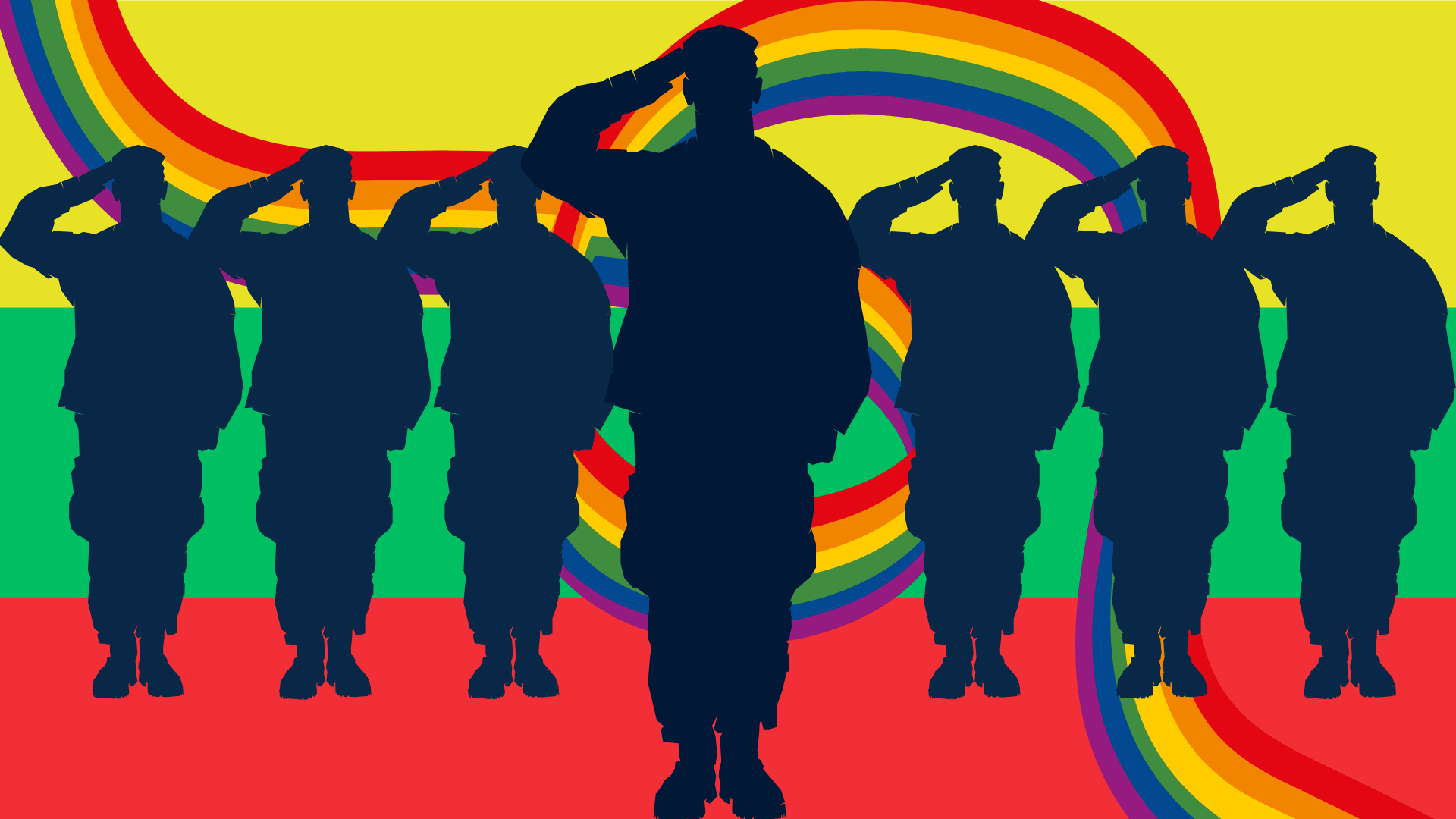By Riska Carolina
A Community in Peril
For Myanmar’s LGBTQIA+ community, the fight for dignity and survival has turned into a major crisis. The 2024 Conscription Law, implemented amid increasing political instability, has forced queer individuals into a cycle of fear, discrimination, and oppression. What was once a struggle for equality has now become a desperate attempt to escape a system designed to erase their existence.
This article is based on the research paper Challenges Faced by the Myanmar Queer Community After the 2024 Conscription Law by Queers of Burma Alternative (QBA) an exile LGBTQIA+ led organization, published in January 2025. This article is well informed by interviews with two Myanmar activists who have left the country.
Forced into Uniforms, Stripped of Identity
Myanmar’s legal framework has never favored LGBTQIA+ individuals. Section 377 of the Penal Code criminalizes "carnal intercourse against the order of nature," carrying a penalty of life imprisonment or up to ten years in prison.[1] This provision applies to both men and women. Additionally, the 1945 Police Act, Section 35(c), criminalizes any person found with their face covered or disguised, with a penalty of up to three months' imprisonment. This law has been used to target transgender people.[2] Both laws effectively criminalize same-sex relationships and further oppress transgender individuals, leaving the LGBTQIA+ community vulnerable to discrimination and exploitation due to the absence of legal protection.
The enactment of the 2024 Conscription Law has only worsened their plight. According to this new the legislation, male citizens aged 18 to 45 and female citizens aged 18 to 35 must serve in the military for a minimum of two years.[3] The purpose of the conscription law in Myanmar is to forcibly recruit young people into the military, primarily to replenish depleted ranks caused by ongoing civil conflicts and battles against ethnic minority armed groups and pro-democracy resistance forces. This law serves as a desperate attempt by the military junta, which seized power through a coup, to strengthen its forces amidst growing opposition.[4]
Under the guise of promoting national duty, this new law forces young LGBTQIA+ individuals into military service. However, based on our source, unlike in many other countries where conscription includes access to resources, protection, and benefits, Myanmar’s conscripts are exploited under deliberately life-threatening conditions on the battlefield.
According to this new legislation, male citizens aged 18 to 45 and female citizens aged 18 to 35 must serve in the military for a minimum of two years.[5]
QBA’s findings indicate that after the conscription law was implemented, military officials specifically targeted young individuals within the eligible age range, particularly those perceived as gay or Assigned Male At Birth (AMAB) and as such target transgender and gender diverse persons. Our source also reported that underaged children have also been widely kidnapped or forcibly conscripted. In many cases, older family members outside of the eligibility criteria have been taken away as well, especially if the originally summoned conscript evades service. Outright International[6] also found that local authorities deliberately targeted LGBTIQ+ individuals due to prejudice, believing that military service would "correct" their identity. Oftentimes, it is simply a form of opportunistic exercise of power also influenced by systemic stigma, as LGBTQIA+ people are considered 'less than common people’' because of the stigma that glues them.
This form of forced assimilation, driven by deep-seated homophobia and transphobia, has created an unbearable reality for LGBTQIA+ youth in Myanmar
Bribes for Freedom: The Price of Avoidance
Conscription has sent a chilling effect across young populations, and many individuals are seeking ways to avoid it. However, evading military service comes at a high cost. Myanmar’s military draft has created a system of corruption, with administrators across the country offering exemptions for a price.[7]
One of ASEAN SOGIE Caucus (ASC) sources revealed that some families have been charged exorbitant fees to exempt their loved ones from conscription. This was also documented in QBA’s report, which showed that those eligible for conscription but unwilling to serve were often forced to pay significant amounts of money to officials demanding financial compensation under various pretexts. Another source also double down by saying, that in many cases, payments are given to other individuals/families in financial need, who will then send a representative to take the place of the people who paid to evade conscription
The amounts requested vary widely, ranging from 500,000 kyats (US$240) to a staggering 50 million kyats (US$23,830),[8] depending on the area and draft quota requirements. For families with financial means, paying these bribes might be feasible. However, for those struggling economically, paying such bribes could result in a lifetime of crushing debt.
For young LGBTQIA+ individuals in Myanmar, the price of freedom is exorbitantly high. Those without financial resources faced limited options—either submit to conscription, or risk of arbitrary arrest, or even forcibly conscripted. Some families were forced to sell their belongings to buy their loved ones' freedom, while others fled, leaving behind everything to escape military service. Leaving Myanmar out of fear of persecution has become an option. Many continue to seek asylum or refugee status, particularly in neighboring countries, further contributing to the already large influx of displaced individuals escaping the ongoing war.
No Place to Run, No Place to Hide
In response to the conscription law, some individuals have taken to social media, stating that they would enter monkhood or marry early to avoid military service. Based on our source these strategies are primarily available to those assigned female at birth, as those assigned male at birth are still targeted regardless of marital status. However, with recent announcements in January 2025 indicating that women's conscription is set to begin, even married women are now at risk of being drafted, further expanding the scope of forced military service.[9]
The junta has stated that permanent exemptions will be granted to religious figures, married women, people with disabilities, those deemed unfit for service, and individuals exempted by the conscription board.[10] However, new reports in January 2025 indicate that these exemptions are not consistently honored. Even individuals who should qualify for exemptions, including those with disabilities and underage recruits, have been forcibly enlisted into military training, further undermining the credibility of these so-called protections.[11] Also there are concerns that the junta can arrest and abduct anyone at will, as there are no laws holding them accountable.
Currently, according to ASC’s sources, escaping Myanmar has become increasingly difficult. Border restrictions and passport renewal limitations have turned the country into a prison for many LGBTQIA+ individuals. Additionally, QBA’s research findings indicate that travel restrictions and passport renewal barriers have made it nearly impossible for affected individuals to leave. Those attempting to cross the border have been stopped at checkpoints and sent back, preventing them from fleeing.
Two activists interviewed by ASC described the immense fear of being trapped in a system that actively seeks to conscript and control them. They reported that some LGBTQIA+ individuals had been kidnapped for military service, while others had no choice but to go into hiding or attempt dangerous border crossings.
Law that turns women into targets of conflict-related abuse
Women in Myanmar face escalating threats of gender-based and conflict-related sexual violence (CRSV) following the enforcement of the junta’s conscription law. Forced into military service, women are exposed to egregious abuses, including rape, gang rape, and sexual slavery—both in conflict zones and within military barracks.[12] The Myanmar military, or Tatmadaw, has a long-documented history of weaponizing sexual violence as a deliberate tactic of war, particularly against ethnic minority communities..[13] The forced recruitment of women under this law significantly increases their risk of being subjected to CRSV.
This violence is not incidental. CRSV in Myanmar represents a strategic and institutionalized practice used by the military to destroy communities, suppress ethnic resistance, and maintain control through fear and trauma. Human rights organizations, including the United Nations, have extensively documented this pattern of systematic abuse, identifying it as amounting to war crimes and crimes against humanity.
The Myanmar military (Tatmadaw) or Burmese armed forces, has long used sexual violence as a strategy of war, not just in the most recent violence against the Rohingya but against other ethnic groups as well.[14] Particularly targeting ethnic minority women in Kachin, Shan, Karen, and Rakhine states.[15] Since the 2021 coup, military forces have systematically targeted women activists, protesters, and ethnic minority women. Women in detention facilities have been subjected to brutal forms of sexual violence, as documented by the International Commission of Jurists (ICJ).[16] These practices underscore the military's reliance on GBV as a tool of suppression and control.
The enforcement of the conscription law has deepened these risks, particularly for women and girls. Under the new law, unmarried women are eligible for recruitment, prompting many families to take desperate measures to avoid their daughters being drafted.[17] This includes arranging early and forced marriages—since married women are exempt—as well as sending girls abroad through informal networks, which often places them in the path of human traffickers and sexual exploitation.
Altogether, these developments illustrate how Myanmar’s conscription law has become yet another mechanism for state-sanctioned violence. The law not only legitimizes the military’s control over civilian lives but also expands its ability to commit gender-based violence under the guise of national service. For women in Myanmar, conscription doesn’t mean serving the country—it means being forced into a system that routinely exploits their bodies as weapons of war.
Psychological and Emotional Toll
Beyond the immediate legal and social dangers, the mental health impact on Myanmar’s LGBTQIA+ community is devastating. According to sources from ASEAN SOGIE Caucus, many LGBTQIA+ individuals live in constant fear of being conscripted or having their identity exposed. This fear severely affects their mental well-being, leaving them without a safe space. As a result, many individuals struggle with severe anxiety, depression, and emotional distress.
QBA’s report documented how various implications of the conscription law have caused widespread fear and trauma. The activists interviewed by ASC echoed these concerns, stating that the lack of security and support networks has only worsened their mental health struggles.
With limited access to mental health resources, many suffer in silence, grappling with the uncertainty of their future. The psychological toll is compounded by the constant threat of forced conscription, societal exclusion, and the fear of violence, leaving many without a sense of safety or stability. Without urgent intervention, the long-term effects on Myanmar’s LGBTQIA+ community will be devastating, further entrenching cycles of trauma and marginalization.
A Call for International Intervention
ASEAN must take decisive action to address the escalating human rights abuses in Myanmar, particularly those targeting LGBTQIA+ individuals and other vulnerable groups. The region cannot afford to remain silent while forced conscription, exploitation, and systemic discrimination continue unchecked. ASEAN must engage in diplomatic pressure, guarantee humanitarian support, and ensure accountability measures to protect those at risk and demand tangible changes from Myanmar’s military regime.
Myanmar’s LGBTQIA+ community is in a protracted crisis, which the work cannot ignore. Human rights organizations and advocacy groups must take immediate action to provide urgent support. Legal protections, safe asylum programs, financial assistance, and mental health services are crucial to safeguarding this vulnerable community.
Without intervention, Myanmar’s LGBTQIA+ community will continue to face systemic violence, economic hardship, and severe psychological distress. This is more than just a plea for help—it is a demand for justice and humanity.
Notes:
---------------------------
[1] Human Dignity Trust, “myanmar”, Dec 17, 2024, https://www.humandignitytrust.org/country-profile/myanmar/, access march 8, 2025
[2] Ibid
[3] Fair Wear, Myanmar activates national conscription law, February 10, 2024, https://wp.fairwear.org/wp-content/uploads/2023/02/Fair-Wear-policy-on-business-in-Myanmar.pdf, access march 8, 2025
[4] Ye Myo Hein “Myanmar’s Fateful Conscription Law: The junta’s shift to compulsory conscription reveals its desperation and solidifies its image as a source of instability”, February 26, 2024,
https://www.usip.org/publications/2024/02/myanmars-fateful-conscription-law, access march 8, 2025
[5] Fair Wear, Myanmar activates national conscription law, February 10, 2024, https://wp.fairwear.org/wp-content/uploads/2023/02/Fair-Wear-policy-on-business-in-Myanmar.pdf, access march 8, 2025
[6] see more at Outright International, “Updates On Implications of the Myanmar Crisis on LGBTIQ People A Situational Brief and Call to Action”, https://outrightinternational.org/sites/default/files/2023-06/WhitePaper_Updates-on-the-Myanmar-Crisis.pdf, March 7, 2025
[7] Khin Khin Ei, Radio Free Asia, “In Myanmar, paying bribes to evade the draft”, April 22, 2024, https://www.rfa.org/english/news/myanmar/bribery-04222024122957.html, access March 7, 2025
[8] Op.Cit, “In Myanmar, paying bribes to evade the draft
[9] see more, Nang Hseng Phoo, Radio Free Asia, Myanmar junta begins recruiting women for active military service, January 28, 2025,
https://www.rfa.org/english/myanmar/2025/01/28/myanmar-women-conscripted/, March 17, 2025
[10] Kelly Ng, BBC, “Myanmar: Young people attempt to flee ahead of conscription order”, February 24, 2024,
https://www.bbc.com/news/world-asia-68345291, March 7, 2025
[11] Independen Mon News Agency, Disabled and Underage Individuals Reportedly Enlisted in Military Training by Myanmar’s Military Junta, January 6, 2025, https://monnews.org/2025/01/06/disabled-and-underage-individuals-reportedly-enlisted-in-military-training-by-myanmars-military-junta/, access March 12, 2025
[12] Human Rights Watch, Sexual Violence by the Burmese Military Against Ethnic Minorities, July 25, 2018 https://www.hrw.org/news/2018/07/25/sexual-violence-burmese-military-against-ethnic-minorities, access march 17, 2025
[13] The Conversation, In Myanmar’s brutal war, the military is weaponising sexual violence against women, children and LGBTQI+ people https://theconversation.com/in-myanmars-brutal-war-the-military-is-weaponising-sexual-violence-against-women-children-and-lgbtqi-people-229916, march 17, 2025
[14] Loc.Cit, Sexual Violence by the Burmese Military Against Ethnic Minorities…
[15] Women’s League of Burma, "Same Impunity, Same Patterns: Sexual abuses by the Burma Army will not stop until there is a genuine civilian government", January 2014, https://www.peacewomen.org/sites/default/files/sameimpunitysamepattern_english-final_0.pdf, access March 14, 2025, see page 1-3 and 7
[16] the International Commission of Jurists (ICJ), Unseen and Unheard: Violations of the Human Rights of Women Deprived of Liberty in Myanmar", A briefing paper, June 2024, page 14,-- WDLs have been targeted with specific forms of sexual and gender-based violence, enduring acts and threats of rape, sexual assault, and sexual harassment, often to obtain ‘confessions’ during interrogations, https://www.icj.org/wp-content/uploads/2024/07/Briefing-Paper_Violations-of-the-Human-Rights-of-Women-Deprived-of-Liberty-in-Myanmar-1.pdf, access March 14, 2025
[17] Public Statement: Women’s Organizations Condemn Junta’s Forced Conscription Law in Myanmar, 8 March 2024, statement signed by Politics for Women Myanmar, Rosy Women’s Union–Dawei, Sisters 2 Sisters, Spouses of People’s Soldiers, Women Advocacy Coalition Myanmar, Women Alliance Burma, Women’s League of Burma, Women Peace Network, https://progressivevoicemyanmar.org/wp-content/uploads/2024/03/IWD_WomensOrg-Statement-on-Conscription-Law-inMyanmar.pdf, access March 14, 2025




